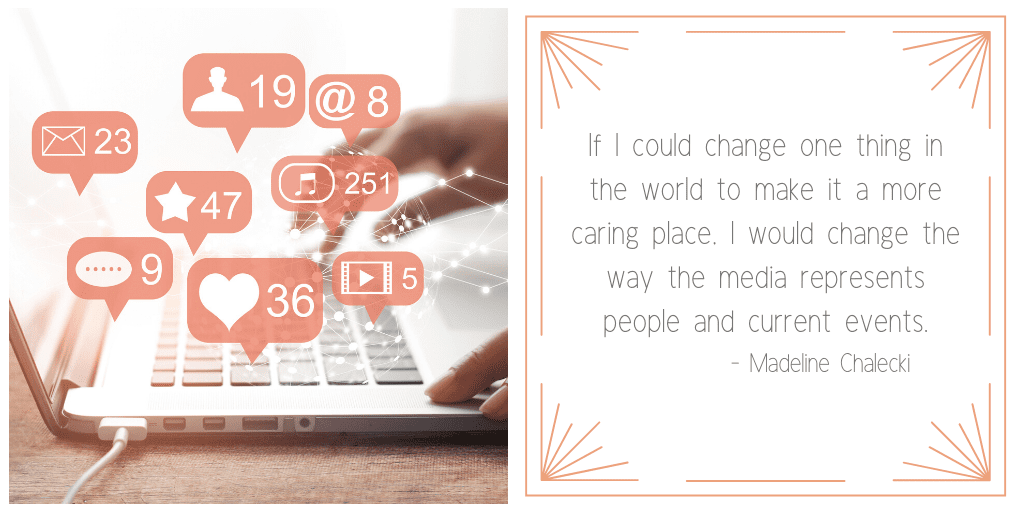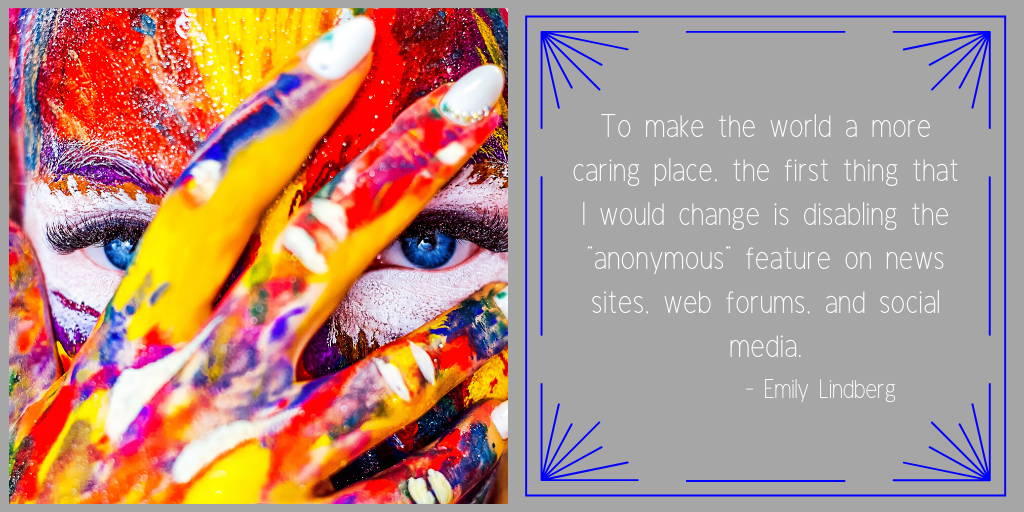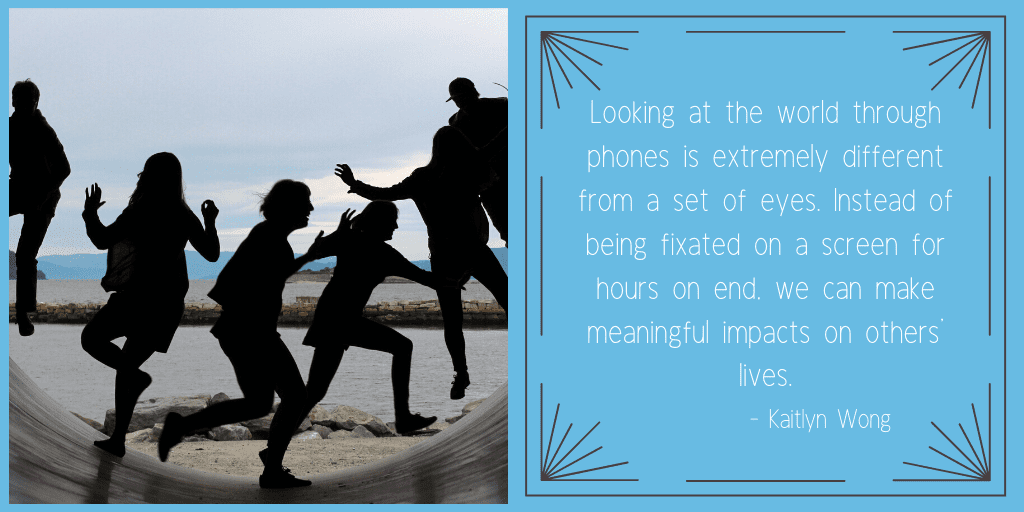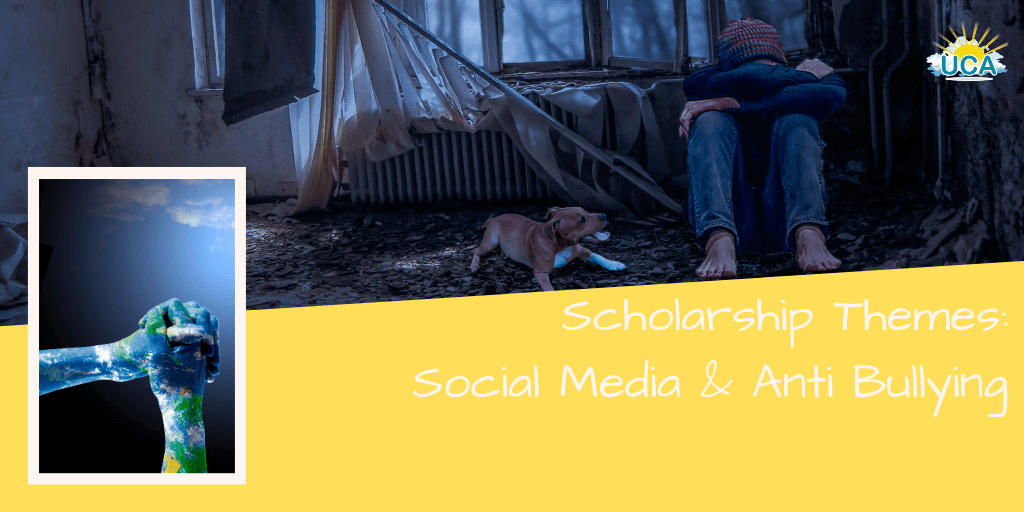
Unified Caring Association (UCA) has scholarship opportunities for U.S. students each year. Each submission that arrives brings excitement and smiles. We are so happy to read about these caring students who share their ideas for a better world. Some of these essays share life stories that reflect how these caring ambassadors help bring more caring into the world. Recently, we began celebrating the various themes that surfaced in essays submitted by students across the U.S. Our first theme was equality. Next we want to thank and cheer those who wrote about social media and anti bullying. We are happy to share some of the essays. These essays have caring quotes that reflect the theme of social media and preventing bullying.
Madeline Chalecki

“My grandfather is an 80-year-old, Jewish, politically conservative man living in rural Maine who spends his time watching and reading the news. And because he is constantly consuming alarming news about murder and crime, he has become scared and closed-minded. It has made him into a person that makes judgments about people of color, is fearful of immigrants, and comments on the “inner cities crumbling into poverty and crime.”
I live over 2,000 miles away in an urban neighborhood in Denver, Colorado. In my daily life, I am surrounded by people of different cultures, socio-economic backgrounds, immigration status and perspectives—but with the same frightening news. The contrast between my grandfather’s views and mine has made me recognize the impact that sensationalized media has on its viewers. If I could change one thing in the world to make it a more caring place, I would change the way the media represents people and current events.
Sensationalized media makes the world seem dangerous by disproportionately portraying negative and violent events more often than positive news. When we are bombarded with that kind of information, it closes our minds and makes us fearful of each other. It is easy to get wrapped up in sensationalized information from the news. When we see more violence than kind acts, we begin to think the world is more aggressive than caring. We become isolated and fearful of people different than us, causing us to become less empathetic, less compassionate, and less caring.
I believe that if the news, as well as other media like Facebook and Twitter, showed a less sensationalized, more accurate view of people and world events, we would become more caring and compassionate towards one another. External forces pull us apart, but they can also bring us together. I would change media reporting to report crime with simple facts, not opinion or hyped up information. I would make it so media talked about crime in a proportional rate to the actual rate of crime. We see more bad than good on the media, but there is more good than bad in real life. I would also want to add a segment to all news channels of positive news about people each day. I know that many news channels have something like this, but it is often irrelevant or uninteresting. Finally, I would want to make social media a less divisive platform by creating pages for open conversation and positive news.
People work tirelessly all over the world to make powerful, progressive, and positive change. I want to create media that includes information about people from Korea to Sudan to Mexico working hard to positively impact communities. I believe that if the news had these new elements, people would be more curious about each other, open towards one another and more hopeful about humanity in general. People could connect over similarities, not just differences. Sensationalized news creates division and fear, but approaching media differently could have the opposite effect. To make the world a more caring place, I would create media that brings us together, portrays the good side of humanity as well as the areas that need improvement. News can become a powerful tool to make the world a more caring place.”
Emily Lindberg

“To make the world a more caring place, the first thing that I would change is disabling the “anonymous” feature on news sites, web forums, and social media. Anonymity is a dangerous game to play because it makes people immediately more ruthless, which then leads to a toxic online environment. Forcing people to put their names on their posts would immediately change the quality of material that was getting posted.
With the continuation of advancements in technology, paper news sources are almost totally obsolete. As a result of this advancement, websites are getting saturated with comments, many of which are tactless and inconsiderate. This effect is amplified by the rise of “anonymous” commenters – it’s as if by taking someone’s identity out of the public eye, they are given permission to tear down others since nobody can tear them down in return. Reading the comments on a news site is like watching vultures circle and subsequently attack an innocent animal. As soon as somebody sees a comment they disagree with, their claws are out and they have no shame in tearing somebody else down.
Social media does nothing but exacerbate this effect. In allowing the public to share their opinions without having to put a name to what they say, platforms are allowing some true colors to shine, which, in a lot of cases, is not a good thing. Racist, homophobic, and bigoted opinions are running rampant over the media. Cyberbullying is on the rise and, as a result of that, suicide. When people are given the opportunity to be anonymous, sometimes good things can happen. But when so many opinions are swirling around, it’s hard to not get sucked in or take things personally.
By removing the publics’ ability to be anonymous, we would force everybody to own up to their opinions and have them face consequences for the things they say that impact other peoples’ lives. Free speech is important, but not so much that it can destroy somebody to the point that they take their own life. Anonymity is toxic. The public can have opinions, but if they choose to share it, their name should forever be stamped on it. The world needs to see people for who they are, not what they post. In-person interactions are never going to be the same as an interaction in the comments section of a YouTube video, so why wouldn’t we change the parameters of the comments section to reflect how people would interact in real life? Human contact is fundamental to our health, but if we are constantly ripped apart on social media because somebody decided to go anonymous, where is that contact that we needed?
Making the world a more caring place requires a lot more changes than this one. But I think that disabling online anonymity would be a start, because it would change the interactions that happen on the Internet, which is where a lot of us spend a good chunk of our time. Society can be good, but we have to make the change that allows them to do good and be seen.”
Kaitlyn Wong


